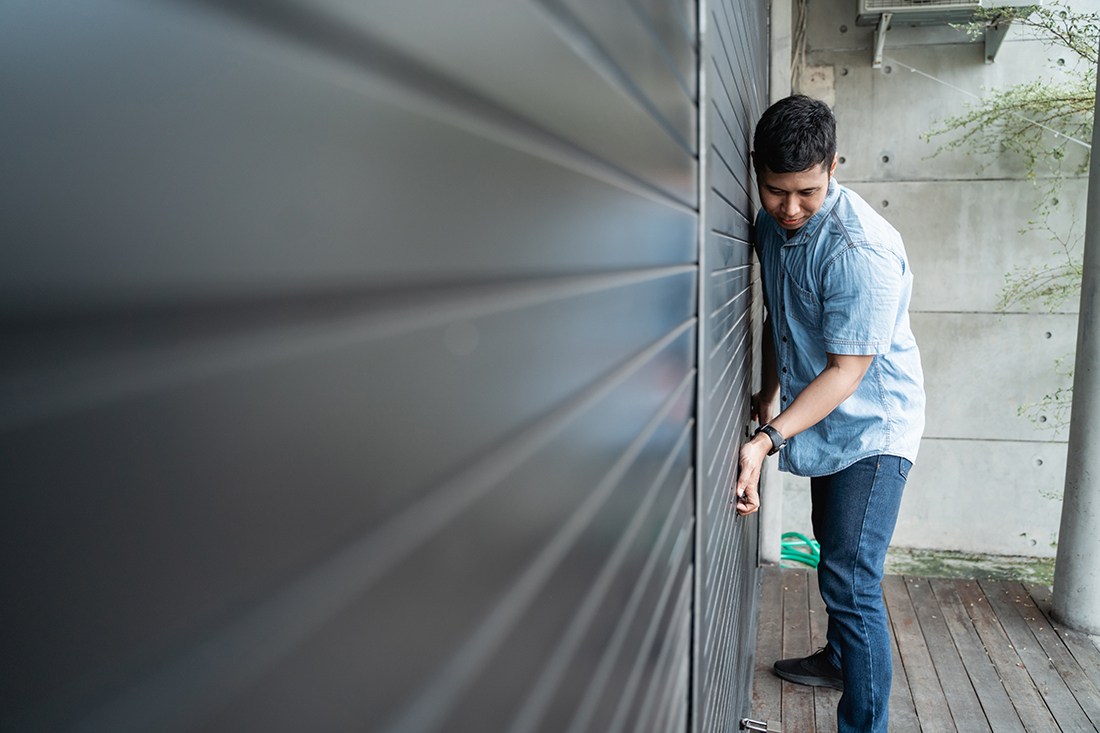Picture this: It’s a busy morning, you’re rushing to leave for work, and just as you hit the garage door opener button, you’re met with an unexpected, nerve-wracking noise. Your trusty garage door, usually an obedient sentinel, is acting up. Common garage door problems can turn your daily routine into a frustrating ordeal. But fret not because, in this blog, we’re going to unravel the mysteries behind these issues and arm you with the knowledge to troubleshoot them effectively. From strange noises to uneven movements, we’ll cover it all. So, read on!
1. Excessive Noise from Your Garage Door
It can be quite alarming if your garage door is suddenly making loud, unsettling noises. The source of the noise may vary, but here are a few potential culprits:
- Loud Grinding Noise: If you hear a grinding noise when your garage door operates, it’s likely due to worn-out or damaged rollers. These are the small wheels that guide the door along the tracks. To fix this issue, replace the rollers; your door should operate more smoothly and quietly.
- Loud Banging or Popping: These sounds could indicate a problem with the springs. Garage door springs play a crucial role in lifting and lowering the door. If they’re damaged or broken, they can make loud noises and cause the door to operate unevenly. Springs are best replaced by a professional due to the high tension involved.
- Squeaking or Screeching: A squeaky door can be a result of insufficient lubrication. To solve this problem, apply a silicone-based lubricant to the rollers, hinges, and tracks. Regular maintenance will prevent future squeaks and keep your garage door operating smoothly.
2. Garage Door is Moving Very Unevenly
If you notice your garage door moving unevenly, it may be a sign of a misalignment issue. A bent track or worn-out rollers can cause this.
Solution:
– Examine the tracks for any visible bends or obstructions. If found, gently straighten them out using a rubber mallet.
– Replace any damaged or worn-out rollers to ensure smooth movement.
– Check the garage door opener’s settings to ensure it is properly calibrated.
3. Garage Door Refuses to Open or Close
It can be an incredibly frustrating situation when your garage door refuses to open or close. The worst part about this is to figure out what is wrong. Garage door opening and closing issues can occur for various reasons, including malfunctioning remote, faulty sensors, or a disrupted power source.
Solution:
– Check the remote’s batteries and replace them if necessary. Ensure the remote is within range of the opener.
– Clean the sensors at the base of the door and ensure they are properly aligned. Remove any obstructions that might be blocking their line of sight.
– Verify that the garage door is receiving power and that the circuit breaker has not tripped.
4. The Garage Door is Not Opening All the Way
If your garage door only opens partially before stopping or reversing, it could be due to an issue with the limit settings or an obstruction in the door’s path.
Solution:
– Adjust the limit settings on the garage door opener. This controls how far the door opens or closes.
– Clear any debris or obstructions from the tracks and inspect the safety sensors for any signs of dirt or misalignment.
5. Your Garage Door Moves at a Crawl
When your garage door moves painfully slowly, it’s typically a sign of a lack of lubrication, worn-out components, or issues with the garage door opener.
Solution:
– Apply a high-quality silicone-based lubricant to all moving parts, including rollers, hinges, and tracks.
– Check for worn-out springs or rollers and replace them as needed.
– Inspect the garage door opener’s motor for signs of wear or damage.
6. Your Garage Door Slams Shut Rapidly
On the opposite end of the spectrum, a garage door that closes too quickly can be a safety hazard. This can be caused by a malfunctioning close limit switch or improperly adjusted force settings.
Solution:
– Adjust the close limit switch to control how far the door descends.
– Test and adjust the force settings on the garage door opener to ensure it stops when it encounters an
obstruction.
7. Mysterious Self-Operation of Your Garage Door
Experiencing a garage door that operates autonomously is inconvenient and a security risk. This can be attributed to interference with the remote signal, faulty wiring, or issues with the opener’s circuitry.
Solution:
– Reset the remote control codes to prevent interference from neighboring devices.
– Inspect the wiring and connections to ensure they are secure and undamaged.
– If problems persist, consider consulting a professional technician to diagnose and fix the issue.
Conclusion
In the pursuit of a smoothly operating garage door, troubleshooting becomes an invaluable skill. Remember, when in doubt, seeking professional assistance is always a wise choice. If you are looking for effortless garage door repair services Ottawa, then contact us at Ottawa Garage Door Experts. At Ottawa Garage Door Experts, our team stands ready to lend their expertise and keep your garage door operating flawlessly.

